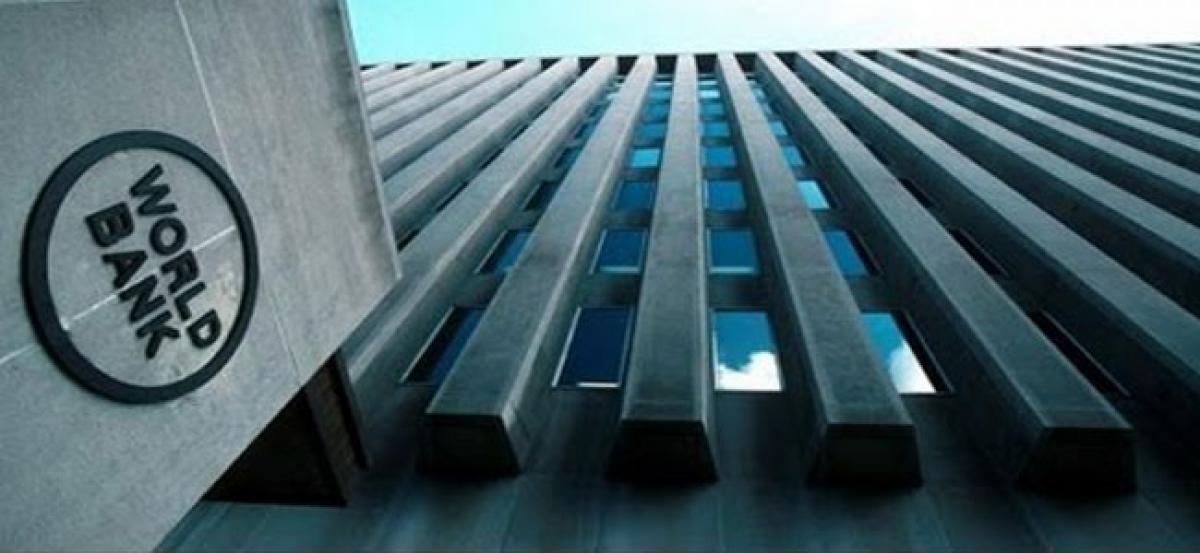Live
- UN organisation urges safe passage for food aid to Sudanese states
- Prez Murmu pays tribute to Bhagwan Birsa Munda on Janjatiya Gaurav Divas
- Ayush Mhatre: From Virar to cricket spotlight, another Mumbai prodigy takes flight
- Can ChatGPT help reduce hospital emissions?
- People urged to participate in caste survey
- Cricket Australia slaps new 10-year ban on Dulip Samaraweera over misconduct
- If jumbo guidelines are implemented, temple festivals will not happen as before: Kerala Minister
- Google Introduces Gemini AI App for iPhone: Enhanced Access with Gemini Live
- Chandrababu's Vision is To Prevent Drought, says Nimmala Ramanaidu in assembly
- Health School programme rolled out in Adilabad
Just In

A modest slowdown is expected in India\'s growth with the GDP expected to fall to 6.8 per cent in 2016-17 as a result of temporary disruption caused by the government\'s demonetisation initiative, the World Bank said on Monday. It also said that the country’s growth is expected to recover in 2017-2018 to 7.2 per cent and is projected to gradually increase to 7.7 per cent in 2019-2020.
New Delhi: A modest slowdown is expected in India's growth with the GDP expected to fall to 6.8 per cent in 2016-17 as a result of temporary disruption caused by the government's demonetisation initiative, the World Bank said on Monday. It also said that the country’s growth is expected to recover in 2017-2018 to 7.2 per cent and is projected to gradually increase to 7.7 per cent in 2019-2020.
Highlights:
- Demonetisation temporarily disrupts economy recovery
- Favorable monsoon will lift the economy
- Agriculture growth to boost economy
- Revenues to further get a boost with GST
“India’s economy was slowing down in early 2016-17, until the favourable monsoon started lifting the economy, but the recovery was temporarily disrupted by the government's demonetisation initiative. As a result, a modest slowdown is expected in the GDP growth in 2016-2017 to 6.8 per cent,” World Bank said in its bi-annual India Development Update released here on Monday.
“Demonetisation caused an immediate cash crunch, and activity in cash reliant sectors was affected. GDP growth slowed to 7.0 per cent year-on-year during the third quarter of 2016-2017 from 7.3 per cent in the first quarter,” it said. While limited data is available, demonetisation may have had a disproportionate impact on poorer households, which are more likely to work in construction and informal retail, the report noted.
“Greater data availability, especially on labor markets, is needed to better gauge the social impact of policies in the future. Despite this, there was a relatively modest slowdown in the economy,” it said.The report attributes it to coping mechanisms, including greater usage of digital transactions, higher rural incomes, and robust public consumption.
The pick-up in rural wages in November and December, 2016, and the growth of agricultural output suggests the positive impact of the monsoons substantially dampened the disruption from demonetisation.
The report said that demonetisation has the potential to accelerate the formalisation of the economy in the long-term leading to higher tax collections and greater digital financial inclusion. The World Bank also noted that India remained the fastest growing economy in the world with strong economic fundamentals and ongoing reform momentum.
“India remains the fastest growing economy in the world and it will get a big boost from its approach to GST which will - reduce the cost of doing business for firms, reduce logistics costs of moving goods across states, while ensuring no loss in equity,” said Junaid Ahmad, World Bank Country Director in India.
The implementation of GST could also be a complementary reform that will support formalisation, as firms have a strong incentive to register with GST to obtain input tax credits, the report said.“GST is on track for implementation in the second quarter of the fiscal year, and is expected to yield substantial growth dividends from higher efficiencies and raise more revenues in the long term.
Timely and smooth implementation of landmark reforms such as the GST and a new code to deal with bankruptcies, as well as decisive action to resolve the NPAs challenge of public sector banks, is crucial to enhance the economy's potential growth,” the report said.

© 2024 Hyderabad Media House Limited/The Hans India. All rights reserved. Powered by hocalwire.com







